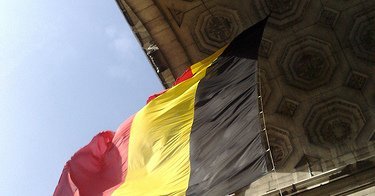Alas! Many debates, intrigues, press leaks, failed efforts to form a new administration and finally failed administrations (Verhofstadt III, Leterme I & II) later, such a consensus is far from reached. When on 22 April 2010 the Flemish liberals threw in the towel it meant the end of another round of discussions on BHV and of the Leterme II-administration.
On 13 June 2010 Belgium had yet again to go to the polling stations. After three years of institutional immobility and a financial and economic crisis, Yves Leterme and his crew were bound to be punished by the voters. Many were disappointed in the fact he couldn’t deliver his promises, and looked therefore to another, more outspoken and somewhat more radical party. The N-VA or ‘New Flemish Alliance’ has a more communal image, to say the least. The party which was some years ago still too small to survive and therefore worked together with the Flemish Christian Democrats, now won almost 30% of the votes in Flanders, making it the biggest party. Oh irony, it nearly had even to deliver the prime minister for a country which it doesn’t want. The N-VA was formed out of the former ‘Volksunie’, a rather small political party striving for an independent Flanders. Now however, they just want to establish a humane Flemish nationalism in a contemporary way and pleads for a Flemish republic in a democratic European confederation [1]. In the French speaking part of Belgium the winners were the socialists. After the elections the N-VA was very eager not to tread on anyone’s toes and therefore rather reluctant to show their nationalist feelings. When the president of the N-VA, Bart De Wever, made his victory speech, they hung a European flag with just one Flemish Lion (nationalist symbol) between the many stars in the background. The N-VA also reached out to its partners in the south. The election outcome sent a clear message to the political parties in the south, where there now exists a will to cooperate with the N-VA and end the political impasse of the last three years. Institutional reform is necessary in Belgium to respond to current and future crises. However, it still needs to be seen if a Flemish nationalist party as the N-VA is able to bring this change around.
So far for Belgium, but what about Europe and Belgian’s presidency of the European Union that will start on 1 July 2010? Many in Europe look grimly at the prospect of an EU presided by a country that has no administration and seems to be in a constant political turmoil. However, it is not the first time a member state presides the Union with an administration in crisis. During the Czech presidency in 2009, the government of Mirek Topolánek fell without there being dire consequences for the EU. The same goes for Belgium. It is not yet known when an administration will be formed, but that doesn’t necessarily mean the presidency will be a disaster. On the contrary. Belgium is a federal state, with regional governments as well.
Many in Europe look grimly at the prospect of an EU presided by a country that has no administration and seems to be in a constant political turmoil.
These still work fine, just as the federal government too, and are well prepared for the presidency. Many competencies are already regional. In the end, a presidency is mostly the work of diplomats and civil servants, politicians being the public face.
The Belgian presidency is a cooperation between the Spanish presidency and the Hungarian next year. This trio or Troika establishes a more coherent cooperation between the member states holding the presidency. This means also that there already exists some general agenda and main objectives around which the three member states will work [2]. This generally doesn’t change a lot, except for some topics that a member state wants to highlight.
Moreover, since the Lisbon Treaty the European Union has now a permanent president of the European Council, Herman Van Rompuy, who actually presides the Council meetings, meaning that the position of a presiding member state is less important during these meetings. During the Greek crisis it was Herman Van Rompuy who called the extraordinary meetings, not José Luis Rodríguez Zapatero. The same accounts for the EU’s foreign policy. International shocks and conflicts will be addressed by the EU’s High Representative for Foreign Affairs and Security Policy Catherine Ashton. While during the Belgian presidency in 2001 it was prime minister Verhofstadt who reacted on the September Eleven attacks, this wouldn’t be the case today.
As one of the founding member states, Belgium has a long tradition of EU presidencies. It even had the first presidency in 1958. Yves Leterme stated that the “EU presidency would be unaffected by the country’s political transition” [3]. So, it’s not really the EU presidency which is in danger. A major cause for concern should be the evolution of a growing regionalisation and nationalism. Is the Europe we want really a loose confederation of closed regions? How odd is the nationalistic reflex as a reaction on an evolving Europeanisation? Can a European Union survive in such an atmosphere? The fact is that the EU has reduced the importance of national governments, just as the evolution of regionalisation has done. However, an introvert nationalism can not and may not be the answer.


1. On 7 July 2010 at 14:41, by Philippe A Replying to: Belgian elections and the EU Presidency
Replying to: Belgian elections and the EU Presidency
Good article!
Follow the comments: |
|
